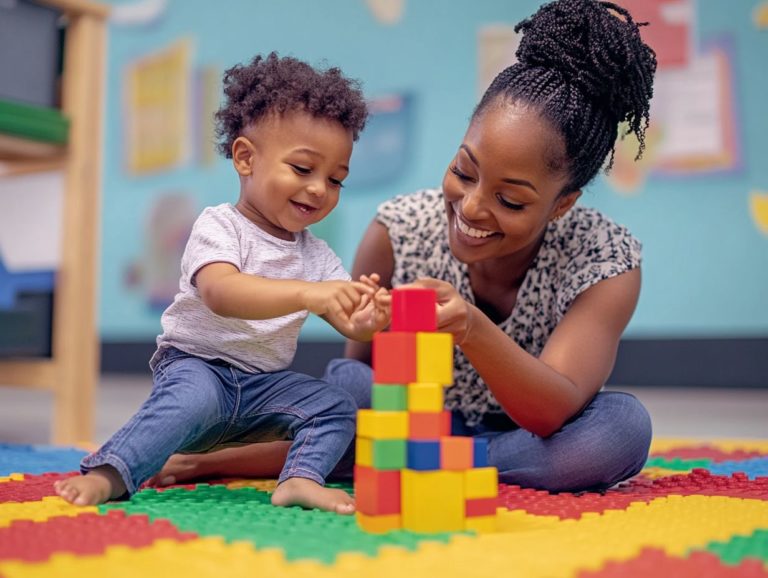5 Signs of a Healthy Parent-Child Relationship
Building a strong parent-child relationship is not just beneficial; it’s life-changing for both you and your child! By grasping the foundations of a healthy connection, modern parents can greatly affect their child’s emotional and social development.
This exploration delves into five crucial elements open communication, mutual respect, support, boundaries, and quality time that cultivate a nurturing environment. It also highlights the myriad benefits of a positive relationship, the repercussions of neglect, warning signs of disconnection, and practical strategies to strengthen your bond with your child, ensuring positive relationships and relationship evolution.
Immerse yourself in this journey to uncover how to foster a loving and supportive atmosphere that enables your child to truly flourish, respecting their independence and pursuing interests.
Contents
- Key Takeaways:
- 1. Open and Effective Communication
- 2. Mutual Respect and Trust
- 3. Support and Encouragement
- 4. Boundaries and Discipline
- 5. Quality Time Spent Together
- How Can Parents Foster a Healthy Relationship with Their Child?
- What Are the Benefits of a Healthy Parent-Child Relationship?
- What Are the Consequences of an Unhealthy Parent-Child Relationship?
- Conclusion
- How Can Parents Address and Improve a Strained Parent-Child Relationship?
- What Are the Signs of an Unhealthy Parent-Child Relationship?
- How Can Parents Ensure Their Child Feels Loved and Supported in the Parent-Child Relationship?
- Frequently Asked Questions
- Understanding Parent-Child Relationships
Key Takeaways:

- Open and Effective Communication: Healthy parent-child relationships are built on open and effective communication, where both parties feel heard and understood.
- Mutual Respect and Trust: Mutual respect and trust are essential components of a healthy parent-child relationship, allowing for a strong and secure bond to form.
- Support and Encouragement: Support and encouragement from parents can foster a child’s self-esteem and confidence, leading to a positive and healthy relationship.
1. Open and Effective Communication
Open and effective communication is the foundation of nurturing relationships between you and your children. It creates an emotionally safe environment where their feelings are acknowledged and respected. By prioritizing active listening, which means really paying attention when your child speaks, and expressing your thoughts clearly, you can guide your children through the complexities of their emotions. This ensures they feel understood and supported as they grow, enhancing your communication skills.
This means creating spaces where your children can share their thoughts and emotions without fear of judgment. Encourage them to articulate their feelings, helping them find the right words to express what they’re experiencing. Validating your child s emotions recognizing and affirming their feelings enables them and builds their self-esteem.
Strong communication skills not only enhance the bond you share but also play a crucial role in promoting their emotional wellness. The ability to communicate openly significantly impacts their personal development. As your children learn to communicate openly, they develop the confidence to face challenges and seek support when needed, setting the stage for healthier relationships in their future.
Such positive parenting practices lay the groundwork for successful adulthood.
2. Mutual Respect and Trust
Mutual respect and trust serve as the bedrock of a strong parent-child relationship. They enable children to thrive emotionally and establish a secure foundation from which they can confidently explore their independence.
When you actively listen to your child s thoughts and feelings, you are not just hearing them; you are acknowledging their autonomy, which fosters a profound sense of validation. This practice shines even brighter when you engage in open discussions, allowing your child to express themselves freely without the worry of being judged. Such support is crucial in fostering emotional resilience.
For example, if your child voices a concern about school, responding with respect and validating their feelings can significantly contribute to their emotional security. By modeling respectful behaviors using polite language and calmly addressing conflicts you reinforce trust and encourage your child to adopt these behaviors in their own relationships.
This approach honors their privacy and fosters trust and respect. This nurturing environment not only addresses their emotional needs but also equips them with the essential tools to build healthy connections with others as they continue to grow, enhancing their relationship dynamics.
Start building a stronger bond with your child today your relationship will thrive!
3. Support and Encouragement
Providing unwavering support and encouragement is essential for you as a modern parent. It helps your children navigate the many challenges they face.
This support fosters resilience and emotional well-being as they navigate their journey toward independence. As a modern parent, this active responsibility is key to their development.
Your involvement is crucial in shaping your child’s self-worth and their ability to cope with life’s inevitable ups and downs. By actively engaging in your child’s interests and recognizing their achievements, you reinforce the vital message that they are both valued and capable.
This kind of parental support is fundamental to their growth. Simple gestures, like offering a listening ear during tough times or celebrating even the smallest victories, can remarkably enhance your child’s confidence.
By creating a nurturing family environment where open communication thrives, you lay the groundwork for lasting emotional strength. This also encourages positive relationships and promotes a secure family environment.
The long-term benefits of this kind of support are profound. It leads to improved mental health, strong interpersonal skills, and a lifelong sense of security that enables your children to confront future challenges with courage.
Such a foundation is essential for their transition into adulthood and achieving financial independence.
4. Boundaries and Discipline

Establishing healthy boundaries and effective discipline strategies is essential for you as a modern parent. This approach not only sets clear expectations but also nurtures the relationship with your child by promoting mutual respect and understanding.
Setting boundaries early on helps in managing big emotions as they grow. When you implement specific guidelines that govern behavior, you create an environment where your children feel safe and secure.
For example, using time-outs to address misbehavior allows children the opportunity to reflect on their actions. You can also use positive reinforcement like offering praise for good behavior to encourage the actions you want to see.
Such practices also involve non-critical feedback, which is essential for emotional well-being. It’s crucial for you to remain consistent and supportive throughout this process, as your involvement fosters a deep sense of loyalty and trust.
Ultimately, these healthy boundaries and discipline strategies not only protect your children but also enable them to grasp the importance of accountability and respect in their lives, contributing to their personal development.
5. Quality Time Spent Together
Spending quality time together creates shared moments that strengthen the bond between you and your children. This fosters a positive relationship built on trust and emotional support.
Such shared moments enhance family dynamics and overall happiness. Engaging in a variety of activities be it family game nights, outdoor adventures, or simply cooking meals together offers invaluable opportunities for connection.
These interactions allow you and your children to share laughter and experiences, helping to create lasting memories that enrich your family dynamics. Make the most of these moments! These shared experiences are truly wonderful.
Being present in these moments nurtures emotional well-being and reinforces the importance of healthy relationships within your household. These activities also help in setting family rules that everyone respects.
Ultimately, these shared experiences significantly contribute to building resilience and understanding for both you and your children. This ensures that everyone feels valued and heard. Such shared moments foster emotional wellness and contribute to positive parenting.
Building a strong bond with your child is a rewarding journey that enriches both their lives and yours. Fostering a healthy relationship requires open communication, emotional support, and respect for their independence. This balanced dynamic ensures that both you and your child feel valued and understood. Clinical psychologists often emphasize these aspects as vital for effective parenting.
How Can Parents Foster a Healthy Relationship with Their Child?
By prioritizing these elements, you can cultivate an environment where your child feels safe expressing their thoughts and feelings. For instance, setting aside regular family time for discussions can significantly enhance open dialogue. This allows your child to share their experiences and concerns, fostering a deep connection.
Actively listening and responding empathetically reinforces a sense of validation. When children feel heard, they are more likely to seek guidance when facing challenges. Such an environment promotes good parenting practices and enriches family dynamics.
Establishing support systems, such as encouraging participation in extracurricular activities, not only fosters mutual respect but also helps your child develop a sense of identity and belonging. This ultimately contributes to their emotional wellness and resilience. Encouraging them to pursue hobbies and interests plays a critical role in their growth.
What Are the Benefits of a Healthy Parent-Child Relationship?
A healthy parent-child relationship brings a wealth of benefits, such as enhanced trust and improved communication skills. These elements are critical for your child’s development and overall well-being. Setting higher standards within the family contributes to these benefits.
When children feel secure in their bond with you, they re more likely to develop emotional resilience, which aids them in navigating challenges and setbacks. This strong foundation fosters better social skills. As they learn to manage their emotions and express themselves effectively, they become skilled at forming friendships and engaging in healthy relationships with their peers.
Creating a nurturing environment significantly reduces behavioral issues. Children raised in supportive settings typically have a clear understanding of boundaries and exhibit greater self-control. These advantages contribute to immediate happiness and stability, laying the groundwork for positive long-term outcomes in their development, influencing their academic success and shaping their lifelong interpersonal relationships. Consistent parental support and involvement lead to such positive outcomes.
What Are the Consequences of an Unhealthy Parent-Child Relationship?

The consequences of an unhealthy parent-child relationship can be profound. This situation affects not only emotional needs but also child development and family dynamics. It can lead to long-term issues in emotional wellness and personal growth that you certainly want to avoid.
Children who lack warmth and support from their parents may grapple with emotional distress, manifesting as anxiety, depression, or low self-esteem. These feelings often lead to behavioral problems like aggression or withdrawal, as they struggle to navigate their emotions without guidance.
As they grow, these children frequently encounter difficulties in building and maintaining positive relationships, creating a cycle of dysfunction that can be hard to break. On the other hand, parents may experience their own share of regret and sadness, feeling disconnected and struggling with their own emotions.
This mutual impact can strain family dynamics, making it essential for both parties to seek healing and understanding. Nurturing these relationships is not just important; it’s essential for a thriving family life!
Conclusion
In summary, fostering a healthy relationship with your child requires dedication to open communication, emotional support, and mutual respect. By creating a nurturing environment, you not only benefit your child’s development but also enrich your family life. Take proactive steps today to build those connections, ensuring a brighter future for everyone involved!
How Can Parents Address and Improve a Strained Parent-Child Relationship?
To address and improve a strained relationship with your child, it’s crucial to prioritize open communication, emotional support, and a genuine willingness to understand and validate their feelings, guided by the idea of positive parenting.
Start by creating a space where your child feels free to talk, encouraging them to express their thoughts and emotions without the fear of judgment. Active listening is essential; it means listening carefully to what they say and responding thoughtfully. Reflect back what they share to ensure they feel truly heard and understood. Strive to identify and acknowledge both your emotions and your child’s, as this practice can foster empathy and build trust and respect between you.
Equally important is the establishment of healthy boundaries. Setting boundaries shows that you care. It also nurtures your child’s independence. Offer non-critical feedback to help your child feel emotionally safe. Remember, rebuilding these connections isn’t an overnight process; it takes commitment, but the rewards are worth it!
What Are the Signs of an Unhealthy Parent-Child Relationship?
Recognizing the signs of an unhealthy parent-child relationship is essential for you to take timely action. Indicators such as a lack of trust, poor communication, and unmet emotional needs can quickly escalate into more serious issues if left unaddressed. Encouraging your child to pursue their interests can also help in identifying areas of potential support.
Stay vigilant for signs like persistent feelings of anxiety or resentment that your child may exhibit during interactions with you. Frequent arguments and misunderstandings, along with your child’s reluctance to seek help or share their feelings, can create an emotional chasm that only widens over time. If your child feels consistently dismissed or invalidated, it could signal a deeper disconnect that requires your attention and may necessitate parental support to repair the relationship.
These troubling patterns often reveal themselves through noticeable changes in behavior, such as withdrawal from family activities or a decline in academic performance. This underscores the importance of nurturing a supportive and open environment that encourages healthy communication, emotional resilience, and positive relationships.
How Can Parents Ensure Their Child Feels Loved and Supported in the Parent-Child Relationship?
To ensure your child feels loved and supported, it s essential to actively demonstrate unconditional love, provide emotional support, and engage in behaviors that prioritize their emotional needs. A clinical psychologist can offer valuable insights into fostering a secure family environment.
This can often be accomplished through simple yet impactful methods like verbal affirmations; reassuring words can truly uplift and instill confidence. Dedicating quality time to shared activities fosters a deep connection, showing your child that they are valued and cherished.
Practicing active listening enables you to understand your child’s feelings and thoughts, creating an environment where open communication can flourish. Engaging in shared moments and pursuing interests together can further strengthen your bond.
By weaving these practices into your daily life, you significantly contribute to nurturing healthy relationships, which in turn fosters emotional wellness, allowing your children to grow into confident and resilient individuals. It’s essential to promote independence while maintaining a secure base for your child’s personal development.
Frequently Asked Questions

What are the 5 signs of a healthy parent-child relationship?
The 5 signs of a healthy parent-child relationship are: open communication, mutual respect, trust, support, and quality time spent together, all of which contribute to positive relationships and a secure family environment.
How does open communication contribute to a healthy parent-child relationship?
Open communication allows for both the parent and child to express their thoughts and feelings, leading to better understanding and a stronger bond. It also aids in honing communication skills essential for relationship dynamics.
Understanding Parent-Child Relationships
Why is mutual respect important in a parent-child relationship?
Mutual respect forms the foundation of a healthy relationship.
It shows that both parent and child value each other’s feelings and opinions.
What role does trust play in a healthy parent-child relationship?
Trust is essential as it creates security and allows for honesty.
Honoring privacy and taking responsibility are crucial for building trust.
In what ways does support contribute to a healthy parent-child relationship?
When parents and children support each other, they create a strong sense of teamwork and understanding.
This bond evolves as children grow into adulthood and seek guidance in decision-making and achieving financial independence.
How does quality time spent together strengthen a parent-child relationship?
Quality time spent together fosters meaningful interactions and cherished memories.
Enjoying each other’s company during shared moments can greatly strengthen the bond.






